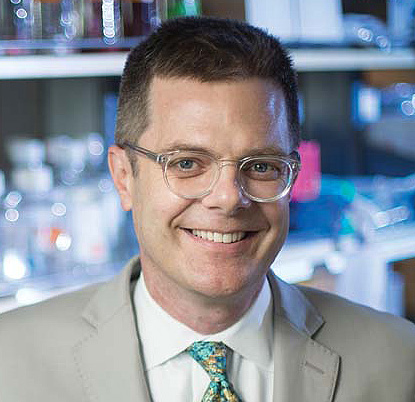Research, News & Discoveries
-

Chikungunya antibody identified by Crowe lab moves forward
Mar. 4, 2021, 8:54 AM by Bill Snyder Evotec, a drug company headquartered in Hamburg, Germany, has begun a phase 1 clinical trial of a monoclonal antibody against the chikungunya virus that was identified at Vanderbilt University Medical Center. This is the second monoclonal antibody against the debilitating tropical… Read MoreMar. 4, 2021
-

Bordenstein elected to American Academy of Microbiology
by Ann Marie Deer Owens Mar. 2, 2021, 5:30 PM Seth Bordenstein (Vanderbilt University) Seth Bordenstein, Centennial Professor of Biological Sciences, has been elected to fellowship in the American Academy of Microbiology, the honorific leadership group within one of the… Read MoreMar. 3, 2021
-

Vanderbilt-developed obesity treatments will be advanced through collaboration with Soleno Therapeutics
by Marissa Shapiro Feb. 25, 2021, 8:00 AM A new partnership between Vanderbilt University’s Warren Center for Neuroscience Drug Discovery and clinical stage biopharmaceutical company Soleno Therapeutics will further research into new clinical treatments for multiple obesity syndromes. Jerod Denton Craig Lindsley… Read MoreFeb. 26, 2021
-

Despite limitations of pandemic, research continues in Basic Sciences
Feb. 24, 2021, 8:00 AM By Jenna Somers Vanderbilt researchers are prolific and resolute in their pursuit of transformative research and innovation. During the Research Ramp-up process, more than 3,000 Vanderbilt research personnel have returned to in-person research activities, while many others have continued remotely through perseverance and ingenuity. On… Read MoreFeb. 24, 2021
-

Calcification after severe injury
Feb. 23, 2021, 8:00 AM by Emily Stembridge Patients with severe injuries, such as level 1 trauma or burns, face many complications of calcification during recovery. One is loss of bone, or osteoporosis. Another is calcification of soft tissue, resulting in heterotopic… Read MoreFeb. 23, 2021
-

Christov & Westover Receive Research Staff Awards
Research Staff Awards honor those who help drive engines of discovery Feb. 18, 2021, 9:57 AM by Bill Snyder Laboratory and administrative personnel at Vanderbilt University Medical Center were honored last week for research excellence during the 17th annual Research Staff Awards, held virtually this year because of the… Read MoreFeb. 22, 2021
-

Genetic clues in eye birth defect
Feb. 18, 2021, 11:00 AM by Leigh MacMillan Uveal coloboma can affect the iris — the colored part of the eye — giving it a keyhole appearance. (iStock) Uveal coloboma — a birth defect that causes a malformation of the eye — accounts for up to 10% of childhood blindness. Read MoreFeb. 18, 2021
-

Dean’s Faculty Fellows program recognizes Neuert, Ren
By Lorena Infante Lara, February 15, 2021 Assistant Professor of Biochemistry Yi Ren and Assistant Professor of Molecular Physiology and Biophysics Gregor Neuert have been recognized as School of Medicine Basic Sciences Dean’s Faculty Fellows. Established in 2020, the Dean’s Faculty Fellows program in Basic Sciences is designed to recognize… Read MoreFeb. 17, 2021
-

SARS-CoV-2 protein blocks an essential step in host gene expression, new discovery finds
by Marissa Shapiro Feb. 17, 2021, 9:00 AM Vanderbilt biochemist Yi Ren is part of a team that has identified a new behavior of a SARS-CoV-2 protein and discovered that interfering with its function can block virus replication in host cells. This opens… Read MoreFeb. 17, 2021
-

Bruce Carter joins CMT Research Foundation scientific advisory board
by Marissa Shapiro Feb. 12, 2021, 9:00 AM Bruce Carter (Vanderbilt University) Bruce Carter, professor of biochemistry and an associate director of the Vanderbilt Brain Institute, has been appointed to the scientific advisory board of the CMT Research Foundation. He joins… Read MoreFeb. 12, 2021